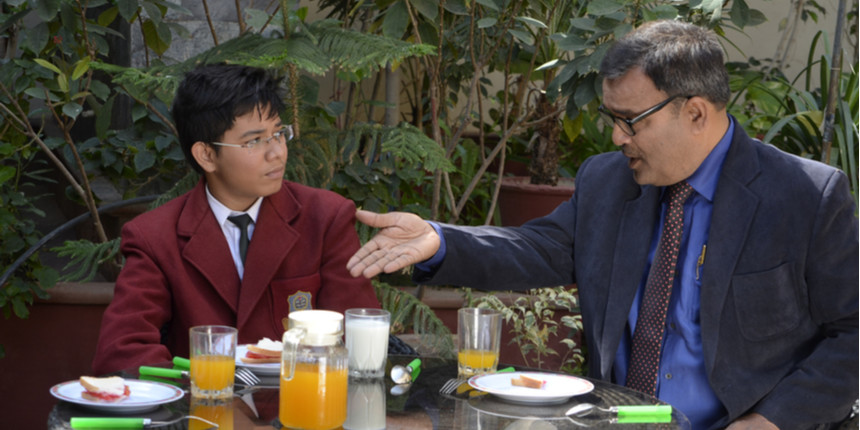8 Mistakes You Should Avoid Making With Your Teenage Child
Adolescence is often a tumultuous time for an individual going through it, as well as their parents. However, it isn’t that we don’t face challenges when we are even younger, or more precisely, aged in the single digits. In fact, I am pretty sure that when a baby starts walking, falls many times and gets up again, it is a challenging skill to develop.

Bearing all the separation anxiety and acclimatising to a school environment that is completely new is definitely not easy for a toddler. Then, what is it that makes adolescence particularly challenging? Perhaps, the rapid physical changes along with the accompanying emotional shifts.
It's important to acknowledge here, that the parent-child relationship often undergoes a change as the child enters puberty and begins to explore adolescence. At the same time, we must know that this change is completely natural, and nothing that one should fear. It could feel like one moment they were all cuddled together on a couch and the next moment everyone is awkward around touch. This happens, and it's okay! The particular aspect of this change that is of interest to me in this article, are the ways in which parents work with their teenagers, and some of the common mistakes parents often end up making that negatively impact their already transforming relationship.
Let us deep dive into some of the common mistakes parents end up making with their teenage children.
Treating Them Like A Child Or An Adult
In my practice as a psychotherapist, I have met many mothers who have shown uneasiness around their daughters' changing bodies at the time of puberty. This discomfort largely comes from a sense of shame around women's bodies that has been ingrained in us, practices around how to cover the body or beautify it, lessons about working hard, being strong but obedient, and preparing for the future that must inevitably involve marriage.
At the same time, the difficulties that boys face at this time cannot and should not be ignored. The heavy emphasis on the body, on being macho-masculine is conveyed to the boys in many ways, which may not be direct. Many a time, the men of the family initiate the boy into manhood by offering alcohol, allowing driving of a vehicle, and similar other behaviours often perceived as macho-masculine. TV commercials, films, and social media also have a huge impact on teenagers. Such changes can be overwhelming for the parents, as a result of which they may sometimes resort to treating the teenager like a child. For example, parents who don’t let the teenager take any responsibilities or learn any new skills. Parents become fearful and overprotective. This can all be very confusing for an adolescent.
Not Having Proper Conversation
In most Indian families, deep emotional conversations often do not happen. Working with families in therapy/counselling, I have studied that conversations are not considered an important part of parenting. Perhaps, we have not experienced talks and conversations with our parents so we find it hard and unnecessary.
Most parenting centres around giving commands, and punishments when these commands are not met with. Important topics like attraction, dating, safe touch, and consent are mostly completely overlooked. The language used might not be scientific, proper, or inclusive, like using funny names for genitals, stories of birds and bees that beat around the bush and connect to making babies, thus leaving the teenager ill-informed, confused, and sometimes even scared. Hence, make out time regularly to speak to your teenager about everything that may be relevant to them, use facts to explain things if any topics make you feel uncomfortable. However, in no case should you avoid speaking to your child about something that is practically important, only because it causes you hesitation.
Not Respecting Boundaries
This is often seen in families where there are fewer boundaries and limits. Like parents asking intrusive questions about friends, checking the teenager's personal objects and space, and not giving physical space while changing or talking on the phone. While all these parental behaviours might emerge from good intentions, it is essential to keep a check on them.
 Respecting Boundaries Enhances The Parent-Child Relationship
Respecting Boundaries Enhances The Parent-Child Relationship
Mostly, the teen will give signals of discomfort in words like ‘Give me my space!’, or by becoming quiet or irritable. The teen might wish to withdraw from the family by keeping busy or hiding things. This lack of understanding may create emotional distance between teens and their parents, if the latter continues to be unregulated.
Unrelated Consequences To Violated Rules
All families have their set of rules. Rules keep us safe and secure. In most families, there is a consequence attached to a task left incomplete, or a rule that is violated. With children, these rules can be enforced with some force. There could be less resistance from the child. However, with a teenager, it is different. For example, you could take away the privilege of going to the park from your 6-year-old child if they do not complete their homework, but taking away a hang-out plan that the teen has will be received very differently.
The 6-year-old might engage in indoor play in absence of outdoors, but the teen will react emotionally, like by getting very sad, angry, or resentful. Plus, many times the consequence given is not related to what is not done or is done incorrectly, like taking away the phone for not eating dinner, or not going out with friends when the teen watches excessive TV. Both these consequences do not give the teen an opportunity to learn, eat dinner, or watch less TV.
Getting Rude With Your Teen
This parental behaviour goes easily unchecked in many households. Actions and behaviours that humiliate and insult the teen never help achieve any connection, goodwill, or change. In my interactions with teenagers, they often share that when parents talk dismissively in public it has a harsh impact on them. It affects their self-esteem and confidence. A teen could also be embarrassed when their parents talk fondly and exaggerate achievements about them in front of others. Sometimes, too much praise can also create unwanted pressures on the teen. Hence, know that your child is now growing into an adult, and would like to be talked to like one. This would also help them feel like dignified individuals.
Abrupt End To Play
A lot of times, parents forget that every individual has a child inside them, as their child gets into teenage. Seriousness about the future dawns on the relationship. Joyful activities like building blocks, playing board games, and going for walks might come to a sudden end. The heavy emphasis on academics cannot be overlooked and emphasised enough here. Scoring marks to prepare for competitive exams becomes the prime focus. There could also be a sudden absence of playful affection from parents. This could make the adolescent serious, aloof, anxious, or very alert around the parents.
The void this leads to can seem small in comparison to the demands of adolescent life, but if we take a moment to think of how wonderful it is to just spend some playful time with our teen we would definitely want to create some intentional moments of play. Here, play can look like doing baking together, building something together, dancing, hiking, or anything both parents and the teen would enjoy. And these are not just planned activities or something you spend a fortune on, but anything that brings pure joy in the relationship such that the seriousness towards the future doesn’t feel like a burden.
Being Overly Critical
Sometimes parents feel it is their duty to criticise the teen, often disguised as advice, to make the teen better and achieve their potential. There can’t be a bigger myth than that! Excessive and unwanted criticism by repeatedly correcting behaviour, making decisions for them, telling them what to do, commenting on traits, looks and qualifications, even commenting on their friends, can be done in jest by the adult but are hurtful to the teen. It can lead to feelings of worthlessness, self-doubt, social anxiety, fear, and worry. Parents must be cautious about the amount of criticism, and the way in which they criticise their child.
Trivialising Their Emotional Problems
This is the last point here but definitely not the least important. In fact, it is so vital that I wonder why I bring it up last. Perhaps, to get your complete attention, now that you have spent your precious time understanding how your choices and action affects your relationship with your teenager. Teenagers are a bundle of emotions. Sometimes, they show their feelings but most times they are kept hidden. Peer relationships are most important and some friendships get solidified during this time. Heartbreaks or the end of early friendships are also experienced. These experiences and similar experiences are often considered trivial by the parents. Teens are asked to ‘move on’, to ‘forget about it’, or ‘be positive’.
Any dismissive attitude of parents towards emotional experiences and other deep emotional problems causes harm. Problems can range from anxiety, social anxiety, low self-esteem, depression, bullying, self-harm, eating disorders, body image issues, and substance abuse. By brushing them under the carpet, not addressing them, and minimising them, we do such a disservice to our teenagers. They have a right to mental health support, through counselling, support groups, peer groups, and socio-emotional life skill education at schools. Parents can be alert to signs like aloofness, sadness, not enjoying or participating in family and social events, avoiding friends, avoiding conversations, and getting into fights. Acknowledging these experiences and feelings that your teen goes through and helping them with the right support shall only help you strengthen your bond with your child.
Humans make mistakes. As parents, we make them more! The idea of this article is not to create more guilt, but to offer an opportunity to prioritise connection over correction, to enjoy this phase of development even though there are so many challenges - a time to rediscover a special bond with your teenager that can last for a lifetime. Having respectful conversations where the teenager feels heard and safe is an important part of this bond. The parents have to unlearn a lot of their behavioural and emotional patterns and responses that no longer serve their family. That is why I want to destigmatise asking for professional mental health support because it is so essential.
Lastly, one of the most essential things to remember is that a parent-child relationship that rests on the foundation of respect and emotional connection can handle these developmental challenges. Such families tend to connect over honest conversations even when they bring unease and discomfort. Along with that, every challenge is a great opportunity to reset, recharge and reinvent ways of bonding with each other.
Gunjan is a Clinical Psychologist and has worked with various schools as a Counsellor, with children across the age spectrum. After more than a decade in the field, she took a sabbatical to focus on her well-being, spending some time travelling, immersing in yoga, and taking care of her twins. Gunjan works to upgrade the conversation around parenting, equal responsibility, career breaks, psychological upheavals, and limitations built into motherhood. Her personal inquiry makes space for a fresh, honest, and nuanced conversation about the reality of urban parenting.
Applications for Admissions are open.
As per latest syllabus. Physics formulas, equations, & laws of class 11 & 12th chapters
JEE Main Important Chemistry formulas
Get nowAs per latest syllabus. Chemistry formulas, equations, & laws of class 11 & 12th chapters
JEE Main high scoring chapters and topics
Get nowAs per latest 2024 syllabus. Study 40% syllabus and score upto 100% marks in JEE
JEE Main Important Mathematics Formulas
Get nowAs per latest syllabus. Maths formulas, equations, & theorems of class 11 & 12th chapters
